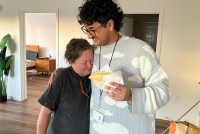Latest KFF Health News Stories
Georgians With Disabilities Are Still Being Institutionalized, Despite Federal Oversight
For nearly 15 years, the feds have had oversight of Georgia’s treatment of people with mental illness and developmental disabilities. Observers say the state still jeopardizes some of its most marginalized residents by not meeting the terms of its settlement with the Justice Department.
After Institutions for People With Disabilities Close, Graves Are at Risk of Being Forgotten
Thousands of people with disabilities lived and died in state institutions. Now, decades after the facilities began closing, the cemeteries left behind are at risk of falling into disrepair.
Social Security Tackles Overpayment ‘Injustices,’ but Problems Remain
With his term soon to expire, Social Security chief Martin O’Malley’s efforts to address the agency’s overpayments to beneficiaries remain incomplete.
More Restrooms Have Adult-Size Changing Tables To Help People With Disabilities
Adults with disabilities and their caregivers are pressing governments and private businesses across the U.S. to help them avoid undignified public bathroom experiences.
Disability Rights Activist Pushes Government To Let Him Participate in Society
Garret Frey won a U.S. Supreme Court case as a teenager who needed assistance to attend high school. Now, he’s gained concessions under Iowa’s Medicaid program to help him live at home instead of in a care facility.
Her Hearing Implant Was Preapproved. Nonetheless, She Got $139,000 Bills for Months.
Even when patients double-check that their care is covered by insurance, health providers often send them bills as they haggle with insurers over reimbursement, which can last for months. It’s stressful and annoying — but legal.
California Lawmakers Preserve Aid to Older, Disabled Immigrants
Lawmakers passed a budget that rejected Gov. Gavin Newsom’s proposal to save nearly $95 million by eliminating in-home support services for qualifying older, blind, and disabled immigrants lacking legal residency. Advocates say Newsom’s plan would have cost more in the long run. Newsom has not indicated whether he’ll veto.
Medicaid ‘Unwinding’ Decried as Biased Against Disabled People
People with disabilities say they are abruptly losing their Medicaid home health benefits and are being advised incorrectly when they call state offices for more information. “Every day the anxiety builds,” one beneficiary told KFF Health News.
Las organizaciones sin fines de lucro señalan que California ha vuelto más difícil retener a los trabajadores en tareas de cuidado después que aumentara los salarios en otros sectores vinculados a los servicios y la salud.
‘Breaking a Promise’: California Deficit Could Halt Raises for Disability Workers
Families of children and adults with intellectual and developmental disabilities say Gov. Gavin Newsom is reneging on an expected pay increase for care workers. If the delay goes through, it could impede services and invite legal challenges from advocates.
En Colorado, reevalúan leyes formuladas para proteger a los menores
Hay esfuerzos en Colorado y otros estados para revertir las leyes que obligan a informar sobre sospechas de abuso o negligencia, argumentando que el resultado ha sido demasiados informes infundados, que perjudican desproporcionadamente a las familias que son pobres, negras, indígenas o tienen miembros con discapacidades.
Mandatory Reporting Laws Meant To Protect Children Get Another Look
The state is looking at ways to weed out false reporting of child abuse and neglect as the number of reports reaches a record high.
California Fails to Adequately Help Blind and Deaf Prisoners, US Judge Rules
Thirty years after prisoners with disabilities sued and 25 years after a federal court first ordered accommodations, a judge found that California prison and parole officials still are not doing enough to help deaf and blind prisoners — in part because they are not providing readily available technology such as video recordings and laptop computers.
Social Security Chief Testifies in Senate About Plans to Stop ‘Clawback Cruelty’
Commissioner Martin O’Malley testifies to two Senate panels that his agency will stop the “injustices” of suspending people’s monthly benefits to recover alleged overpayments. The burden will be on the Social Security Administration to prove the beneficiary was to blame.
Exclusive: Social Security Chief Vows to Fix ‘Cruel-Hearted’ Overpayment Clawbacks
New Social Security Commissioner Martin O’Malley is promising to change how the agency reclaims billions of dollars it wrongly pays to beneficiaries, saying the existing process is “cruel-hearted and mindless.”
Advocates Say a Practice Harms Disabled Children, Yet Congressional Action Is Stalled
In the photos, a 9-year-old boy with autism appears barricaded between cubbies and furniture stacked near the walls of a North Carolina classroom. His mother, Erin McGrail, said her son was physically restrained at least 14 times while in third grade at Morrisville Elementary School. She said she learned details of his seclusion only after […]
In Los Angeles, Occupational Therapists Tapped to Help Homeless Stay Housed
Los Angeles County is deploying a small team of occupational therapists to help newly housed individuals adjust to life indoors. Therapists are trained to recognize disabilities and help with basic living skills, such as hygiene and cleanliness, that can help prevent clients from getting evicted or slipping back onto the streets.
Insurance Doesn’t Always Cover Hearing Aids for Kids
California’s governor vetoed a bill extending insurance coverage for kids with hearing loss, but most states now require it.
Escuelas ignoran normas federales sobre restricción y aislamiento de estudiantes
La ley federal exige que los distritos escolares informen al Departamento de Educación de Estados Unidos cada vez que aíslan o restringen físicamente a un estudiante.
America’s Health System Isn’t Ready for the Surge of Seniors With Disabilities
More than a third of older adults have a disability. Many find it difficult to get the medical care they need. New federal regulations would address that problem.
























